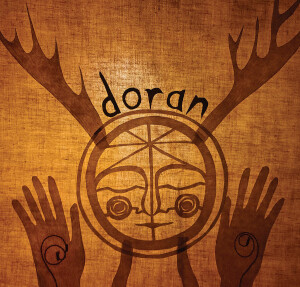 Doran is the sound of four young musicians engaged in the serious business of playing with sound. These four, who hail variously from the Pacific Northwest, New York City, and rural Virginia, have made one of the most spine-tingling and yet comforting albums of American folk music in 2021.
Doran is the sound of four young musicians engaged in the serious business of playing with sound. These four, who hail variously from the Pacific Northwest, New York City, and rural Virginia, have made one of the most spine-tingling and yet comforting albums of American folk music in 2021.
The members of Doran are all conceptual artists in addition to being musicians. They’re Channing Showalter and Annie Schermer, multi-media performance artists and musicians who perform as West of Roan; Brian Dolphin, who is a songwriter, performer and producer, a Thomas J. Watson Fellow, Fulbright recipient, and doctoral student of Ethnomusicology at the CUNY Graduate Center; and Dolphin’s wife, ballad singer Elizabeth LaPrelle, one half of the popular folk duo Anna & Elizabeth. Dolphin and LaPrelle were living in Brooklyn in 2019, but shortly after they had their first child they moved to her family’s homestead in Rural Retreat, Virginia, where this, Doran’s first album, was recorded shortly before the pandemic began.
The album focuses especially on the four musicians’ voices. Whether a capella or accompanied by one or two or a few acoustic instruments, they sing intricate and sometimes improvised harmonic arrangements. Their sound is sometimes recognizably Appalachian and sometimes recognizably Eastern European, sometimes floating etherially between the two. Their approach is informed by all of these musicians’ deep knowledge of folk ballads, a knowledge that bridges the sometimes wide gap between scholarship and genetics. This music isn’t just in their heads or in their bones; they inhabit it fully, or it inhabits them.
All of these songs but one were written by members of Doran, but for the most part they sound ancient. The first thing that hits you is the sound of their voices. Brian’s “Deer People” is an a capella tune that opens and closes the album, the first time as composed and the second an improvization. Spine-tingling four part harmonies with wordless vocals, its melody repeated four times, each iteration getting a more complex harmonic arrangement.
Channing’s “Old Moon” is similar but with lyrics sung in intricate Appalachian harmmony. Annie’s “Arbegen” is a multi-part fiddle tune with a strong Eastern European vibe, a wordless vocal chorus interposed before the final run through the fiddle tune.
For me the album’s centerpieces are Brian’s “And We Are Going” and Channing’s “Solstice.” The former is a two-person round accompanied by a nyilon stringed guitar, fingerpicked in folk style. It’s a modern indie folk song in the style of an old ballad, perhaps from New England – you can imagine the Little Women and Laurie singing this in the attic. I like what someone at their label, SPINSTER, says about it:
At the intro of “And We Are Going,” violinist and vocalist Annie Schermer says, “You planned it, and you asked for it, and now it’s happening.” Her words were about Brian’s eagerness to start recording, yet over time that phrase and the chorus, “and we are going where we wanted to go,” evolved to become a mantra for the members of Doran’s musical lives—a prayer in the midst of chaos and uncertainty that as artists they might go where they wanted to, where they asked and planned to go.
“Solstice” was written for the group upon Channing’s return to her childhood home in the Northwest. It’s my favorite on the album at this point, but I don’t know if that was influenced by the fact that I first heard this album on the solstice. The lyrics include lines like “Sing, sing, the light the light” and other solstice-related sentiments, over beautiful layers of non-verbal harmonic singing.
There’s lots more here, all of it quite perfect for a cozy night in front of the fire during these long dark nights. Elizabeth sings the lilting, melodic ballad “Down The Road” accompanied by an Appalachian dulcimer, its sweet sound a lovely contrast to her unadorned alto. Fans of Richard and Mimi Fariña will feel right at home with this one. Channing sings the very old-school “Bread And Water” to the accompaniment of a droning fiddle, and the haunting “Boy/Moon” to a wheezing harmonium. Brian’s Celtic-tinged “Bondfolder” is an instrumental in a stately march time, featuring twining fiddle parts, and he accompanies himself on guitar as he sings “Day Into Night” in his yearning tenor. He also plays guitar as accompaniment to Annie on the spoken word piece “The Shadow Walks Behind You,” which calls to mind “By The Shore” from Anna & Elizabeth’s masterpiece The Invisible Comes To Us.
Doran is a quiet little masterpiece of homemade music. There are rough edges in spots, voices sometimes search for the exact note they want to complete a harmony, which helps it feel like you’re listening in on a house concert. These four musicians have graced us with an album that’s balm for the soul. You can learn more about it, listen to samples and hopefully purchase it in some form on Doran’s Bandcamp site.
(SPINSTER, 2021)
